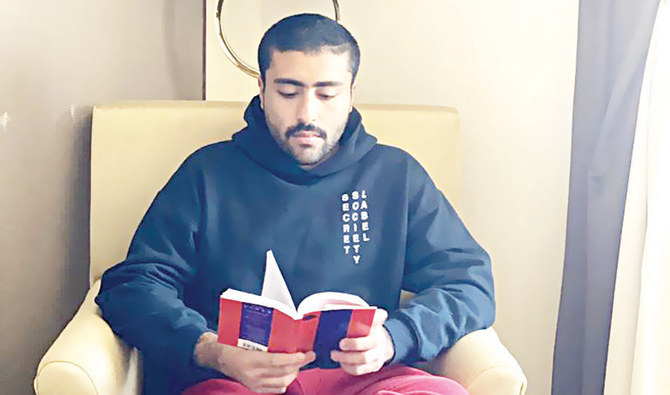RIYADH: As part of the Saudi government’s precautionary measures to contain the coronavirus disease (COVID-19), some hotels have been converted into quarantine centers to receive passengers arriving from countries where the virus has spread.
All passengers are taken directly from the plane to hotels to stay for 14 days with full medical care at the government’s expense.
Omar Al-Amoudi, a Saudi freshman studying entertainment management at the University of Central Florida (UCF) in Orlando, flew to Riyadh with his sister from Washington on March 15. He shared his story of his experience of quarantine with Arab News after returning from the US.
“Once I saw how serious this pandemic is and how the US government is not taking serious measures to fight it, my sister and I decided to come back home since schools are closed too,” Al-Amoudi said.
He said that all measures taken were professional except for the airport experience, which he described as “the most inconvenient part of the whole journey.”
“We arrived in Riyadh at 11 a.m. and there was nobody in the airport except people that came with us on the same flight and official personnel either working at the Ministry of Health or airport security,” he said.
“We headed to the customs counters as usual, and I noticed as we were walking to the counters that there were doctors sitting at screens, monitoring our body temperatures through thermal cameras.”
Al-Amoudi had a connecting flight to Jeddah, but did not know then that he would not be catching it due to mandatory quarantine.
Passengers were put on buses the next morning, where Al-Amoudi and his sister joined the family bus and received their luggage.
“We were on one of the last flights to enter Saudi Arabia, so this was a unique situation,” he said.
Al-Amoudi found out that they were heading to a hotel after his friends who came to Jeddah from London the same day informed him that there was a mandatory quarantine.
Although Al-Amoudi’s airport experience was uncomfortable, he praised the hotel procedure and how smoothly it went.
“When we entered (the hotel) there was a doctor from the Ministry of Health telling us that we were going to be quarantined for 14 days,” he said. “In less than 15 minutes, my sister and I had our own rooms each. It’s a four-star hotel, which is very decent with spacious rooms.”
He said that each person was assigned a separate room and had to stay there alone, but there were exceptions for families with children.
Al-Amoudi said that his experience at the hotel had been excellent. “On my first day, I asked a guy from the hotel staff about schedules of food and housekeeping services. He told me that we could order whatever we want whenever we want. The whole staff is dedicated to serving us and everything is at the expense of MoH.”
There were some rules and instructions that all guests had to follow, he said, adding that the hotel management “distributed agreements where you sign that you accept the rules of the quarantine.”
Some of the rules say that guests have to stay for 14 days and are not allowed to leave their rooms. If anyone shows any symptoms, they have to call the clinic on the hotel’s second floor.
Brochures apologizing for any inconvenience on the first day were distributed among guests on the second day of their stay.
HIGHLIGHTS
• All passengers are taken directly from the plane to hotels to stay for 14 days with full medical care at the government’s expense.
• Omar Al-Amoudi says he is spending his days reading, playing video games, calling friends and watching movies.
• He is also attending all of his online classes and completing his school assignments.
Other papers informing guests that there was a psychiatrist on-site were also distributed in case anyone needed help.
Al-Amoudi was called to the clinic on the third day for COVID-19 tests. “The testing procedure is very simple; they put a cotton swab up your nose and take a sample. The test took less than five minutes,” he said, adding that both his sister’s and his results were negative.
Although the siblings’ tests are negative, he said, they will still need to complete the 14-day quarantine. They will be tested again on the 13th day and if they are clear they will be free to leave the premises.
It is now day eight in quarantine for Al-Amoudi and he is expected to stay for four more days.
He said that he is spending his days reading, playing video games, calling friends and watching movies.
“I have managed to finish four books and more than five movies. I started to make TikTok videos too! It’s really hard to fight boredom but as the days pass, I’m getting used to it and considering it as a break to get to know myself better.” Al-Amoudi said that he is also attending all of his online classes and completing his school assignments.
“The overall experience is really weird and hard to imagine. I’m going to tell this story to my grandkids. No words can describe how well we are being treated here and how special I feel. I have been to a lot of fancy places but I haven’t been treated this special,” he said.
“Saudi Arabia showed us and the whole world that its citizens and residents are its top priority.”





























